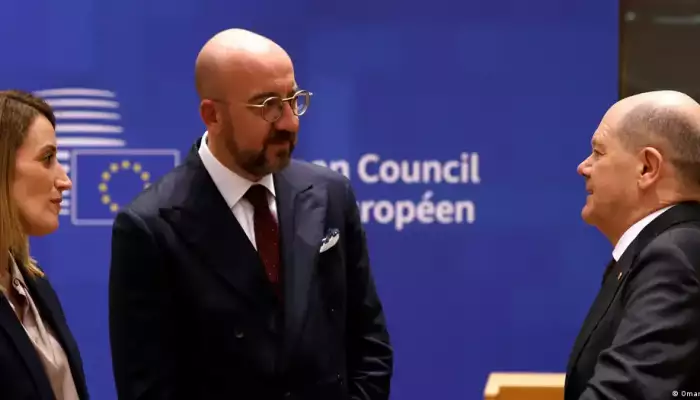
Leaders of the European Union (EU) urged Israel and Iran to de-escalate mounting tensions at a meeting in Brussels on Wednesday. Originally dedicated to sharpening the bloc's economic competitiveness, the EU summit was overshadowed by the recent turn of events in the Middle East.
The EU is eyeing fresh sanctions on Iran after the Islamic Republic fired over 300 missiles and drones toward Israel on Saturday. These were overwhelmingly shot down by Israeli air defenses, backed by a coalition of allies led by the United States.
Tehran said the attack was retaliation for an air strike on its embassy complex in Syria on April 1, which killed several senior officers from the Islamic Revolutionary Guard Corps (IRGC). Iran blames Israel for the strike. According to UN experts, both attacks may have broken international law.
On Wednesday, German Chancellor Olaf Scholz welcomed the fact that Israel had largely fended off the aerial strike, but appealed pointedly to his ally for restraint. "For us, it is important that this moment, this success for Israel, gets used for further de-escalation (…) and not to answer with a massive attack."
Drones under fire
Ahead of the two-day summit, EU foreign affairs chief Josep Borrell had already signaled that fresh sanctions on Iran's drone program were underway.
The idea is to expand an existing set of sanctions that aim to limit Iran's support for Russia's war of aggression in Ukraine. According to Borrell, the EU could expand this framework to include missiles, as well as deliveries to various Iranian proxy groups in the region.
Many EU leaders expressed support for the move on Wednesday, including French President Emmanuel Macron, Germany's Scholz, Spanish Prime Minister Pedro Sanchez, Dutch Prime Minister Mark Rutte, and Belgian Prime Minister Alexander De Croo. "Our duty is to expand these sanctions," Macron said.
Speaking on condition of anonymity ahead of the summit, a senior EU official said an expansion of sanctions could be achieved within two weeks. The US announced plans for similar sanctions on Iranian drone production on Tuesday.
'Words are not enough'
Israel is pushing for tougher western sanctions, including more punitive measures on the IRGC, a military organization that was formed after the Islamic Revolution in Iran of 1979 and works in parallel with Iran's regular military.
"Words are not enough," Israel's Minister for Diaspora Affairs and Combating Antisemitism Amichai Chikli told reporters during a visit to Brussels on Wednesday. "We need to see decisive economic sanctions against Iran, against Iran Revolutionary Guard personnel, their leaders, their assets, all across the world, to shut down embassies."
"I don't think any Western state should have an embassy in Iran," he added.
The EU has already sanctioned a number of individual IRGC members on human rights grounds following domestic acts of repression. Amid last year's tough crackdown on anti-government protesters In Iran, the European Parliament pushed for listing the IRGC as a terrorist organization . At the time, the decision was not passed.